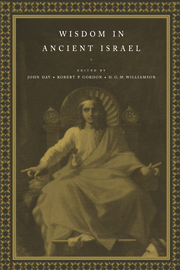Book contents
- Frontmatter
- Contents
- List of abbreviations
- Introduction
- Part 1 The ancient near eastern setting
- Part 2 Old Testament and Apocryphal texts
- 4 Foreign Semitic influence on the wisdom of Israel and its appropriation in the book of Proverbs
- 5 The limits of theodicy as a theme of the book of Job
- 6 Qoheleth
- 7 A house divided: wisdom in Old Testament narrative traditions
- 8 Wisdom in Solomonic historiography
- 9 Amos and wisdom
- 10 Hosea and the wisdom tradition: dependence and independence
- 11 Isaiah and the wise
- 12 Jeremiah and the wise
- 13 The wisdom psalms
- 14 Wisdom and Daniel
- 15 Ecclesiasticus: a tract for the times
- 16 The Christian use and the Jewish origins of the Wisdom of Solomon
- Part 3 Themes
- Biographical note: John Adney Emerton
- Bibliography of the works of John Adney Emerton
- Indexes
- Principal biblical and apocryphal references
8 - Wisdom in Solomonic historiography
Published online by Cambridge University Press: 16 October 2009
- Frontmatter
- Contents
- List of abbreviations
- Introduction
- Part 1 The ancient near eastern setting
- Part 2 Old Testament and Apocryphal texts
- 4 Foreign Semitic influence on the wisdom of Israel and its appropriation in the book of Proverbs
- 5 The limits of theodicy as a theme of the book of Job
- 6 Qoheleth
- 7 A house divided: wisdom in Old Testament narrative traditions
- 8 Wisdom in Solomonic historiography
- 9 Amos and wisdom
- 10 Hosea and the wisdom tradition: dependence and independence
- 11 Isaiah and the wise
- 12 Jeremiah and the wise
- 13 The wisdom psalms
- 14 Wisdom and Daniel
- 15 Ecclesiasticus: a tract for the times
- 16 The Christian use and the Jewish origins of the Wisdom of Solomon
- Part 3 Themes
- Biographical note: John Adney Emerton
- Bibliography of the works of John Adney Emerton
- Indexes
- Principal biblical and apocryphal references
Summary
In his status quaestionis of about fifteen years ago, J. A. Emerton, to whom this study is dedicated, noted that the influence of the sages upon Deuteronomy had been well evaluated in M. Weinfeld's synthesis, Deuteronomy and the Deuteronomic School. According to Weinfeld, ‘the authors of Deuteronomy and the deuteronomic school must be sought for, then, among circles which held public office, among persons who had at their command a vast reservoir of literary material, who had developed and were capable of developing a literary technique of their own, those experienced in literary composition, and skilled with the pen and the book: these authors must consequently have been the sōferim-hkamim’; at the same time, these latter seem only to have appeared as a socio-professional group in the time of Hezekiah, so that ‘Hezekiah may be considered the historically true patron of wisdom literature’. Meanwhile, in his methodological article on the influence of wisdom on the historical literature, J. L. Crenshaw listed only ‘Gen 1–11, 37, 39–50, Exod 34, 6f, Deut, II Sam 9–20, 1 Kings 1–2, Amos, Habakkuk, Isaiah and Jonah’.
Even though there are some exceptions, these positions which have been adopted in contemporary exegesis appear somewhat paradoxical: even if it seems legitimate to associate the deuteronomic school with the group of scribes/sages which is attested from the reign of Hezekiah onwards, nevertheless, as far as the biblical tradition is concerned, it is not Hezekiah, but Solomon, who was the patron of wisdom, and it is surprising, to say the least, that the Solomonic history of 1 Kings iii–xi does not usually feature among the list of historical texts in which exegetes have uncovered wisdom influence.
- Type
- Chapter
- Information
- Wisdom in Ancient Israel , pp. 106 - 118Publisher: Cambridge University PressPrint publication year: 1995
- 4
- Cited by



